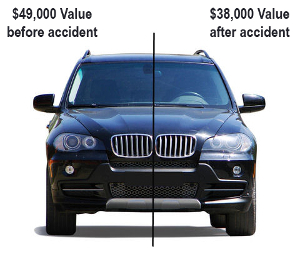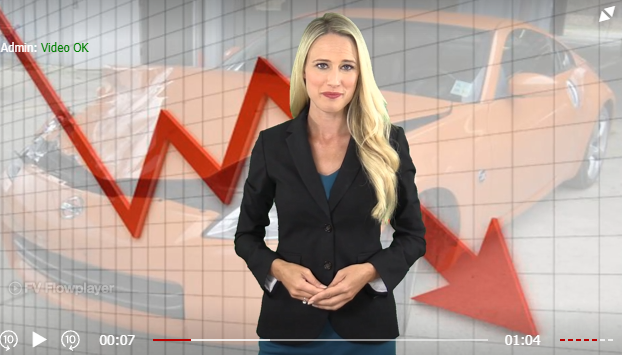If you’re the victim of an accident then your car will probably lose value.You need to get paid for the loss!

What Is Diminished Value?
When a car accident occurs, insurance companies will often quickly pay to repair the immediate damages; However, diminished value comes into play when trying to RESELL a car that has been in a collision! If you try to sell your car after a crash, you’ll probably discover that it’s not worth as much as it was before.
Once your vehicle has been wrecked and repaired, it has probably lost value! This loss in value is called Diminished Value. It is the difference between what a car is worth before and after an accident.
Due to Carfax® and Autocheck® reports, now its easy to know a vehicle’s prior accident history. It’s well known that used car dealers will decrease the vehicle value due to its accident history.
What most people don’t know is that you can be compensated for this loss by filing a diminished value claim against the at fault driver’s insurance company.
Why Consider a Diminished Value Appraisal?
Everyone knows insurance companies are not in business to be generous. The majority of states require that the owner prove their loss to receive compensation. This requires that you provide evidence to support your claim. A diminished value appraisal is a tool that can be used to get the proper amount you are rightfully due.
Few are aware that you have to file a separate property damage claim to pursue diminished value. Diminished value in most states only applies to a third party loss meaning someone else has to be at fault. Except for a few states, the at-fault driver’s insurance company is responsible for payment. Since they are not your insurance company, you cannot expect them to act in your best interest. Most insurance companies will avoid the topic of diminished value as much as possible. It’s up to you to bring it up and if you do, BE PREPARED FOR A FIGHT! If you don’t get a professional appraisal, there’s a good chance the insurance company will have the upper hand.
Three steps in pursuing a DV claim:
1. Analyze Feasibility
First we’ll need you to send a copy of your repair estimate. You can fax or email a copy or use our assignment form. From that we will review your situation and then contact you after doing a feasibility analysis to determine if your case is worth pursuing. This is all FREE! Because different factors affect diminished value and your chance of recovery, we first review what’s on the vehicle history, the year make and model, any liability concerns and what insurance company you are filing against. We will then follow up with you on whether your diminished value claim is worth pursuing.
2. Determine Amount
If your claim seems feasible then the next step is to proceed with an appraisal. Insurance companies are skilled at paying as little as possible and will offer significantly less than what your claim is worth. They may use unfair formulas to determine the amount of your claim. The most accurate and fair way to determine how much your vehicle decreased in value is to actually gather data from multiple used car sales managers in the local market. Don’t accept an insurance company formula. The Bureau of Certified Auto Appraisers indicates that, “Using a formula only to determine the post repair value of a vehicle is not acceptable under any USPAP or BOCAA guidelines.”
3. Pursue Claim
The last step is to submit a demand to the insurance company. We provide you with a sample demand letter that you can edit and submit to the insurance company. Most adjusters will pay the claim once they receive a legitimate appraisal, however some will attempt to negotiate with you. We’ve heard every excuse and seen every tactic, and can assist with additional information to help negotiate your claim. Unfortunately some companies can be very difficult to deal with, which is why all three steps are so important in successfully pursuing a claim. If it ultimately becomes necessary to seek the assistance of an attorney then you’ll be well prepared.
The Secret Insurance Companies Don’t Want You to Know
